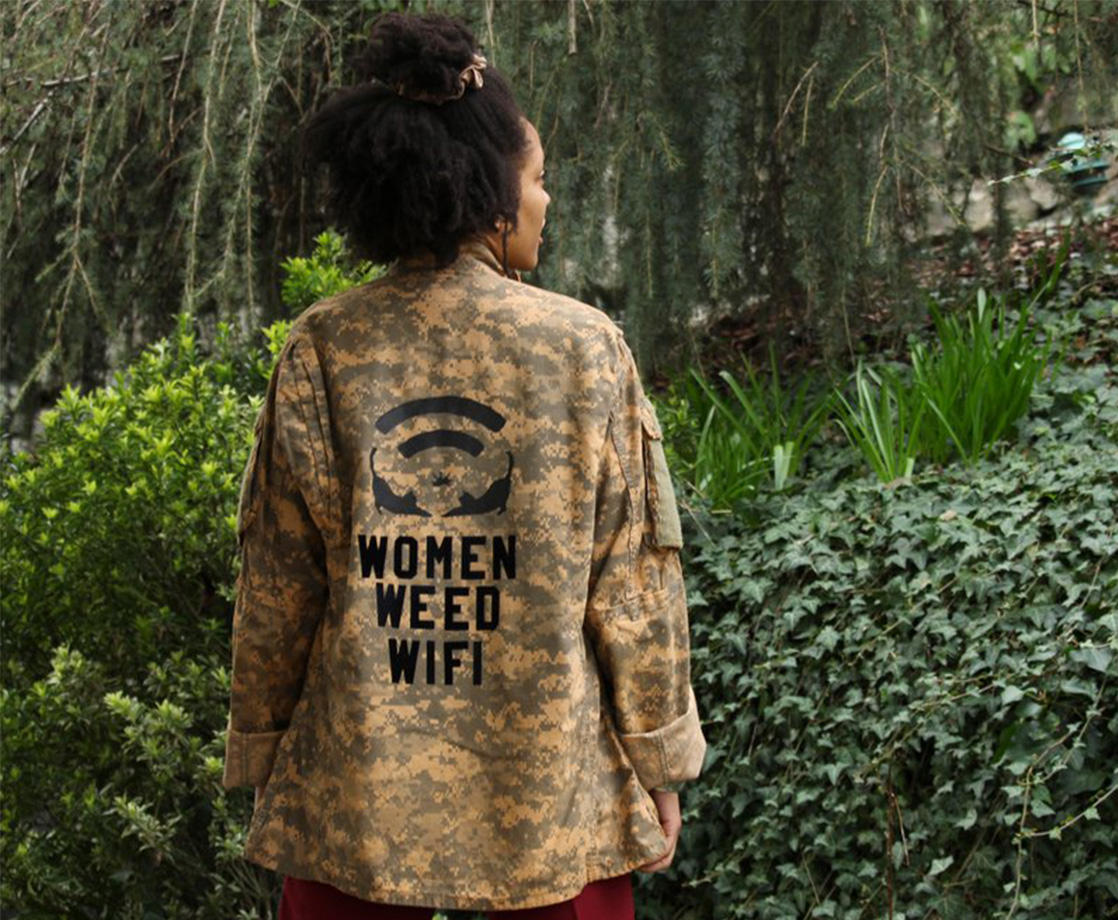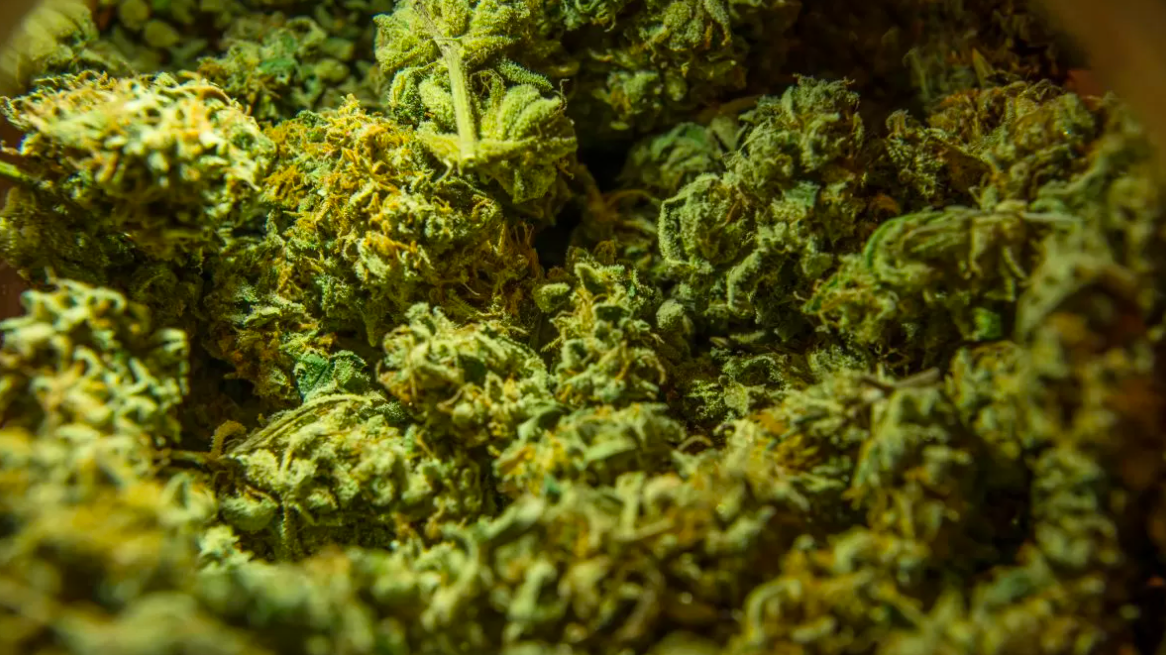Women.Weed.WiFi is an art collective led by women of color that's intent on challenging many of the stereotypes, stigmas, and disparities that surround women, young minorities, and marijuana. The collective gives space for artists from marginalized communities to learn about the medicinal and spiritual benefits of cannabis, as well as how the legal cannabis industry can bring about real change for people, particularly people of color.
Based in Seattle and founded by Amanya Maloba, Janice Ibarra, and Vanity Thomas, Women.Weed.WiFi writes weed reviews and "Mystic Marijuana" astrology posts, curates DJ mixes called "Swisher Sessions," and provide spiritual healing services as "an alternative to expensive therapy, spas, and yoga classes." The latter, WWWiFi's Smoke + Stretch Series, allows participants to rejuvenate their mind, body, and spirit through yoga and guided meditation while safely exploring how cannabis can enhance the practice.
On top of curating events and safe spaces for women/femme of color to mobilize and celebrate all things marijuana, the collective also sells merch, including WWWiFi clothing and zines featuring cannabis-friendly creatives. The ladies released their first zine — Say Perhaps to Sobriety — in March 2016, less than a year after the collective began. This release focuses on "how we maintain our sanity — whether that includes sobriety or not." Zines Hu$tle & Flow and Once Upon a Lit Time came next, each with their own themes and various contributors.

Creating zines was a natural way for Maloba, Ibarra, and Thomas to share art and connect with other like-minded women outside their home city. This weekend, the collective will release the fourth issue of its zine series, No Hell For Sinners. "This issue comes from the silent scream of living on the outskirts of society and what is deemed acceptable behavior while trying to survive and navigate the world," shares Maloba. The crew elaborated on the project's goal in a post on their site:
"This issue of the zine is for women who find their spiritual laws at odds with those of man; For those that dress up for court dates or who've ever said goodbye to an incarcerated parent or loved one. This is for those who pray for protection from the law and do whatever they want, for those who steal when they have to, and those who have permanently lost someone to the system or the hustle. For anyone that has previously been persecuted for weed… or if you've never been caught… We wanna know, is hustling in your blood? Would you do it again (are you still at it?)? Did you ever think it was all over, but somehow you escaped? Is your passion illegal? We want to know."

Above, Vanity Thomas, Janice Ibarra, and Amanya Maloba — the founders of Women.Weed.WiFi — photographed by Meron Menghistab
The collective's three founders all worked in medical and recreational dispensaries prior to forming the collective. The ladies say they experienced exploitative and unfair treatment, including racism and misogyny, as a result of being the only women and young people of color on staff. Rather than let their brushes with oppression deter them from pursuing their highest intentions, Maloba, Ibarra, and Thomas took it as an opportunity to create a platform and space for them to heal and grow; something that could unite other cannabis-inspired women artists and aspiring entrepreneurs of color, and ideally encourage more diversity in the legal cannabis industry.
"We started the collective to be a loving, healing, supportive space for ourselves where we can create without being under the gaze of a world that we find ourselves constantly at odds with," Ibarra told MERRY JANE. "We have freedom that comes only from women/femme supporting and believing in one another."

Although there are many cannabis organizations and feminist groups that claim to be "inclusive," many of these supposedly intersectional groups don't give much attention or extend their platform to young people of color, and/or individuals within the LGBTQ community. Women.Weed.WiFi believe this can lead to the perpetuation of racism, sexism, ageism, and classism being ignored or rarely addressed in the cannabis community.
"Intersectionality is a word that gets misused often, especially in regards to feminism and/or women's liberation," explains Maloba. "Intersectional theory was coined by a black woman, Kimberlé Crenshaw, to describe the complexity of experiencing oppression and discrimination when multiple parts of your identity are marginalized and subject to exclusion, and everything is integrated and interrelated including racism, sexism, and classism. This point of intersection is where black and brown feminism, or womanism, was created to redefine."
In building a community of cannabis-inspired women of color artists, healers, and community activists, Women.Weed.WiFi have employed their voices and platform to advocate for true intersectionality in the legal marijuana space. In the same manner that flowers of the female cannabis plant bring healing and insight to the lives of those who seek it out, the ladies have empowered young female minorities, artists, and entrepreneurs to tap into their own divine feminine energy. And, as the collective rightly points out, this energy and presence is notably absent from the majority of cannabis businesses and startups.
"While the cannabis industry is exciting in its visibility of women, many of these professional women and prominent cannabis groups are predominantly created by and for white women, so we black, indigenous, women of color (BIWOC) are not included even there," says Maloba. "This is why it was so important we carve out a space to provide support and share resources with other BIWOC."

The collective's criticism falls in line with racial disparities across the cannabis industry, as well as decades of disproportionate incarceration rates within minority communities. The echo chamber initiated by Women.Weed.WiFi is intended to drown out the murmuring of those who doubt the vision and ultimately shatter the status quo.
That said, the WWWiFi team willingly admits they have their work cut out for themselves: "From our experience, businesses and owners don't always take us seriously or feel the need to treat us with the same professionalism they would extend if we were 40-something white men in business suits," says Thomas. In the past, the group has been screwed out of payment for their services, and notes that cannabis brands have rejected working with them based on seemingly racially-motivated biases.

The ladies of WWWiFi hope that by sharing their experiences in the cannabis industry, they will inspire others to stand up for what they believe in. Maloba, Ibarra, and Thomas will continue to use the WWWiFi platform, as well as zines, curated events, and collaborations, to advocate for women, young people of color, and cannabis until their vision of a more progressive legal weed industry becomes reality.
"We hope to continue to use the cannabis industry as one of many frontiers to improve the quality of life for our people, using cannabis to heal individuals and our communities at large. We want to see black, indigenous, people of color be able to create generational wealth for themselves," says Thomas.
Join the ladies of Women.Weed.WiFi on March 10th from 9PM to 2AM at Mount Analogue in Seattle for the launch of their new zine 'No Hell for Sinners.' The party will feature poetry readings from zine contributors, flash tattoos, DJs, and more!
Visit Women.Weed.WiFi's website for more on the collective
Follow Nicolle Callier on Twitter











